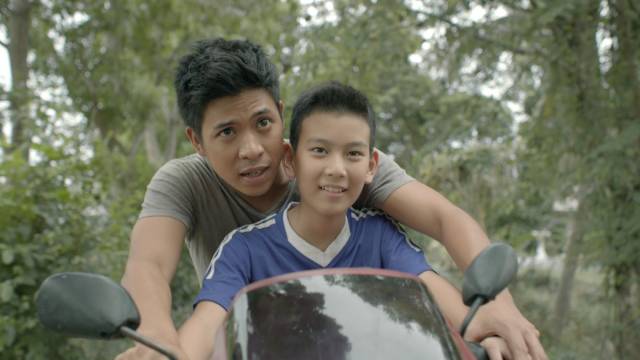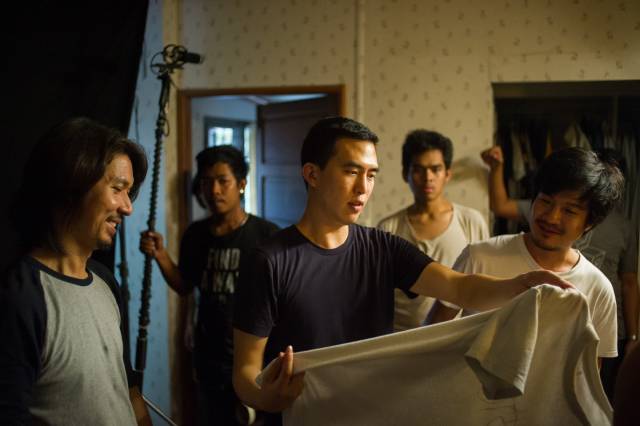
 Josh Kim’s How to Win at Checkers (Every Time) is a moving tale of loss and growing up, set in Thailand it centers on eleven-year-old Oat (Ingkarat Damrongsakkul) and his relationship with his openly-gay brother Ek (Thira Chutikul), whose boyfriend Jai (Arthur Navarat) is accepted into their house. Touching on class difference, Jai is significantly better off than Ek and Oat, Thai army drafting which is done by a lottery Ek might “win”, and how childhood memories affect who we become, the film is a sensitive, straightforward feature length debut from Kim.
Josh Kim’s How to Win at Checkers (Every Time) is a moving tale of loss and growing up, set in Thailand it centers on eleven-year-old Oat (Ingkarat Damrongsakkul) and his relationship with his openly-gay brother Ek (Thira Chutikul), whose boyfriend Jai (Arthur Navarat) is accepted into their house. Touching on class difference, Jai is significantly better off than Ek and Oat, Thai army drafting which is done by a lottery Ek might “win”, and how childhood memories affect who we become, the film is a sensitive, straightforward feature length debut from Kim.
Based on two short stories by Rattawut Lapcharoensa, the film provides insight into Thai society and culture, without ever feeling invasive, a feat that might have gotten it selected as Thailand’s Foreign Language Oscar submission. I spoke to Kim about his work with the actors, adapting the story and the importance of LGBT films.
How was it to adapt the short stories?
I first heard about it on NPR, when they talked to Rattawut Lapcharoensap on All Things Considered, I thought it was interesting, and based on what I learned about one of the stories, I bought the book, and as I read it, I “watched the film”, it was written in such a visual way. Writing the screenplay was easy, because the author almost wrote it like the script. I wrote so many pages so quickly. I could smell the gasoline, hear the motorcycle...and even though it’s set in Thailand, it’s about people I knew in my life.
You even learned Thai to make the film!
I was there for three years, by then I’d been trying to make films for 10 years, and I was desperate. I gave myself one last chance, if this doesn’t work, I’ll find something else to do. I did everything I could to make it happen.
I couldn’t help but think of The Hunger Games when I saw your film. This lottery system is brutal, it’s almost hard to believe it’s not out of sci-fi.
There was a short story published in The New Yorker in the 1950s called The Lottery, in which the people get together to wait for a piece of paper to be pulled out of a box, and the winner. the person who wins the lottery runs screaming “it’s not fair”, because it means she gets stoned to death. I think it’s a critique to tradition, it makes us look at tradition in our lives, thinking about that short story made me think how ironic it was, instead of winning something, you get killed.
Are there any campaigns to get rid of this system of drafting?
In Korea for example it’s mandatory, the US did the lottery as well, they’d pick a number, everyone born on this birthday had to submit to Vietnam. Thailand was the only country doing it this way, but it’s so effective that Malaysia also adopted it.
How did you avoid making the film exploitative and/or moralistic?
In some ways I didn't want to make poverty porn, the original story was much darker. I went to all these places, the temples in the book were temples in real life, I went to these places for location scouting and we saw the houses, one house had a dirt floor, one big room, trash everywhere. 90% of the Thai crew thought this was the house we should use, but I had conflicts for a long time, I was watching a Thai film and I decided I could have poetic license of setting my film in a normal house. It was a conscious decision, even though it led to many arguments with the Thai crew (laughs)

How did you get such understated performances from the actors?
Most of the direction is done in casting, Ingkarat Damrongsakkul had done some acting, one other film, commercials, he came in and I wanted his crying to be real, not stage crying, we needed a kid who knew how to cry, after having him cry three times I said “I think this is our guy”. The hardest part was not only casting the brother, but also someone who got along well. But after finding the right actors, by the time we were on set half the job was done.
What would you say is the importance of telling LGBT stories like this?
One of the reasons I started doing films was I liked movies so much because they transport you to different worlds, you’re suddenly in a different country, with different customs. I enjoy traveling through films, you get to learn about the world. Once I heard an LGBT director say “until the lion has his or her own storyteller, the hunter will always have the best part of the story”, I remember watching LGBT films and thinking “that’s not me”, so as LGBT filmmakers, we can write stories about people we really know. That was important to me.
How was it like to have the film submitted as the Thai Oscar entry?
A surprise, I was in Texas, I went to sleep and they announced it, when I woke up I had all these messages, what just happened? One thing I was worried from the beginning, the film had to be a good thai film first, I didn’t want to make a film that pleased “everyone”, it had to please Thai people first. We wanted to make it true to Thailand, someone told me “this film is more Thai than any other Thai films”, it was a great compliment. We’re lucky for the support we got from audiences and the Thai industry.
How to Win at Checkers (Every Time) will be available on DVD and VOD on 02/02.